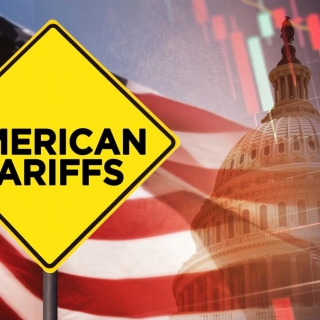


The impact of U.S. President Donald Trump's sweeping tariff agenda is likely to be seen in the upcoming second-quarter corporate earnings season, according to analysts at Capital Economics.
Despite having largely delayed the implementation of his punishing "reciprocal" levies first unveiled in April, Trump has left a baseline 10% tariff in place, as well as heightened duties on items like steel, aluminum and autos. The effective U.S. tariff has in turn increased compared to its level at the beginning of Trump's second term earlier this year, analysts have suggested.
This week, Trump has embarked on a new chapter of his tariff drive, issuing letters to more than a dozen nations threatening them with elevated duties if they are unable to reach a trade deal with Washington.
However, Trump has paused the date for his reciprocal tariffs to take effect to August 1. They were previously slated to kick in on Wednesday, after having initially been postponed in April.
Trump has also said he will slap 50% duties on U.S. copper imports and hinted that other sector-specific tariffs could be coming on semiconductors and pharmaceuticals.
Economists have predicted that the tariffs could drive up consumer prices and, eventually, weigh on activity.
In a note to clients, the Capital Economics analysts said "there has not been big effect" on prices so far, although they flagged that they anticipate the uptick in inflation will be reflected in the upcoming consumer price index report for June.
"While that could partly be the result of a winding down of stockpiles accumulated before higher tariffs came into effect, we now suspect U.S. firms will eat more of their cost, if only in the short run for political reasons," the analysts wrote.
Notably, Trump previously took aim at Amazon (NASDAQ:AMZN), after reports said the e-commerce giant was planning to outline the cost of trade tariffs to its customers.
The higher tariffs could become more apparent in companies' next quarterly results, with the levies particularly threatening to dent gross profit margins, the Capital Economics analysts said. They noted that Wall Street estimates for forward twelve-month gross margin expectations were already pared back following Trump's "Liberation Day" tariff event on April 2.
The analysts added there has also not been "big downgrading" to margin predictions across the U.S. stock market.
"A glass-half-empty view would that there is plenty of margin for error," they said.
Source: Investing.com
Federal Reserve Chair Jerome Powell on Thursday responded to a Trump administration official's demands for information about cost overruns for a renovation project at the central bank's Washington hea...
The United States Commerce Department is set to impose preliminary anti-dumping duties of 93.5% on graphite imported from China after concluding the materials, which are a key component for batteries,...
U.S. President Donald Trump's decision to ramp up arms shipments to Ukraine is a signal to Kyiv to abandon peace efforts, Russia said on Thursday, vowing it would not accept the "blackmail" of Washing...
Federal Reserve Governor Adriana Kugler said the US central bank should keep interest rates steady "for some time," citing accelerating inflation as tariffs begin to push up prices. "Given the stabil...
Unemployment claims fell 7,000 to 221,000 in the week ending July 12, compared with the median estimate of 233,000, according to Labor Department data. The estimated range was 220,000-240,000 accordi...
The dollar headed for a second straight weekly gain against major peers, buoyed by some solid U.S. economic data that supported the view the Federal Reserve can afford to wait a while longer before cutting interest rates again. The yen remained on...
Gold steadied and was set for a moderate weekly loss as investors assessed the outlook for Federal Reserve rate cuts after resilient US jobs and retail data eased concerns about the economy. Bullion traded below $3,340 an ounce, heading for a 0.5%...
The USD/CHF pair tumbles to around 0.8030 during the early European session on Friday. Persistent trade tensions and Federal Reserve (Fed) policy uncertainty boost the safe-haven demand, supporting the Swiss Franc (CHF). The preliminary reading of...
 U.S. consumer prices increased by the most in five months in June amid higher costs for some goods, suggesting tariffs were starting to have an...
U.S. consumer prices increased by the most in five months in June amid higher costs for some goods, suggesting tariffs were starting to have an...
 European stocks erased early gains and closed mostly lower on Tuesday as markets continued to assess how potential tariffs from the US may hurt...
European stocks erased early gains and closed mostly lower on Tuesday as markets continued to assess how potential tariffs from the US may hurt...
 The U.S. central bank will probably need to leave interest rates where they are for a while longer to ensure inflation stays low in the face of...
The U.S. central bank will probably need to leave interest rates where they are for a while longer to ensure inflation stays low in the face of...
 President Donald Trump's renewed calls for Federal Reserve Chair Jerome Powell's resignation have prompted investors to protect portfolios against...
President Donald Trump's renewed calls for Federal Reserve Chair Jerome Powell's resignation have prompted investors to protect portfolios against...